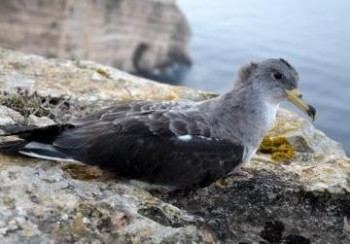Diego Rubolini (Dipartimento di Bioscienze, Università degli Studi di Milano, Italy) and colleagues have published in the journal Ethology on colony attendance and foraging activity in Scopoli's Shearwaters Calonectris diomedea in relation to moonlight.
The paper’s abstract follows:
“Moonlight is known to affect the nocturnal behaviour and activity rhythms of many organisms. For instance, predators active at night may take advantage from increased visibility afforded by the moon, while prey might regulate their activity patterns to become less detectable. Many species of pelagic seabirds attend their colony only at night, in complete darkness, avoiding approaching their nest sites under moonlight. This behaviour has been most often interpreted as an antipredator adaptation (‘predation avoidance’ hypothesis). However, it may also reflect a lower foraging efficiency during moonlit nights (‘foraging efficiency’ hypothesis). Indeed, moonlight may reduce prey availability because preferred seabird prey is known to occur at higher depths in moonlit nights. Using high-accuracy behavioural information from data loggers, we investigated the effect of moonlight on colony attendance and at-sea nocturnal foraging in breeding Scopoli's shearwaters Calonectris diomedea. We found that birds departing for self-feeding trips around the full moon performed longer trips than those departing around the new moon. On nights when the moon was present only partly, nest burrow entrances took place largely in the moonless portion of the night. Moreover, contrary to predictions from the ‘foraging efficiency’ hypothesis, nocturnal foraging activity increased according to moonlight intensity, suggesting that birds increased their foraging activity when prey became more detectable. This study strengthens the idea that colony attendance behaviour is strictly controlled by moonlight in shearwaters, which is possibly related to the perception of a predation risk.”

Scopoli's Shearwater fledgling, photograph from BirdLife Malta
Reference:
Rubolini, D., Maggini, I., Ambrosini, R., Imperio, S., Paiva, V.H., Gaibani, G., Saino, N. & Cecere, J.G. 2014. The effect of moonlight on Scopoli's Shearwater Calonectris diomedea colony attendance patterns and nocturnal foraging: a test of the foraging efficiency hypothesis. Ethology DOI: 10.1111/eth.12338.
John Cooper, ACAP Information Officer, 30 December 2014

 English
English  Français
Français  Español
Español